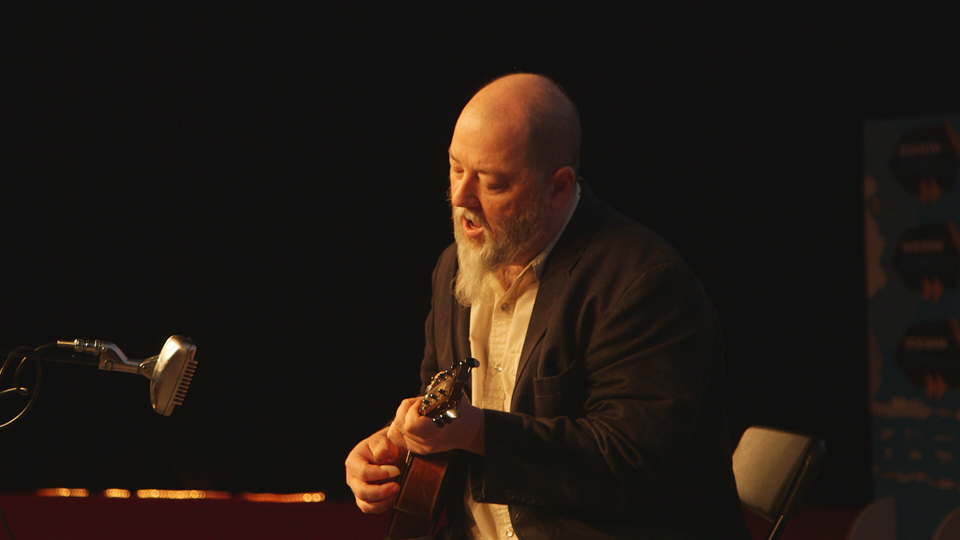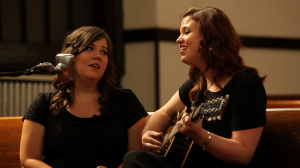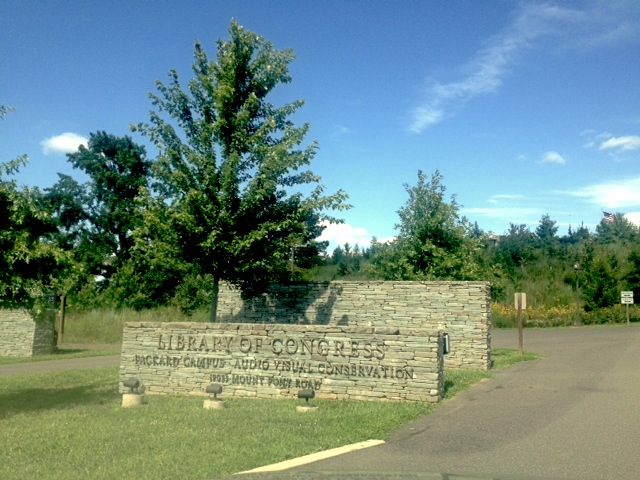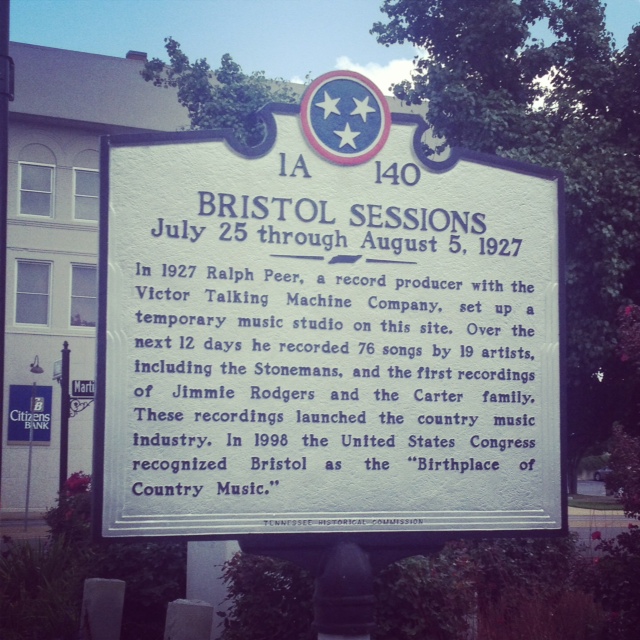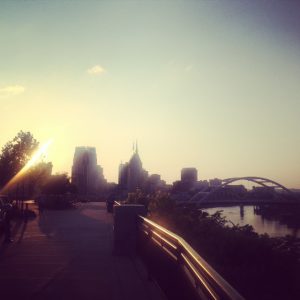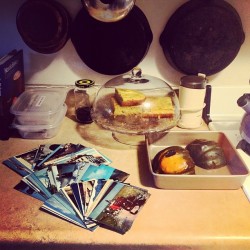Winter’s spirits are all around us, in the bare trees and the silent snow. It brings to mind the spirits we met during our time in Louisiana and our unforgettable stay at the home of the musician Gerard Dupuy.
The following video of and writings about our time spent in Gerard’s generous company originally appeared in the Oxford American.
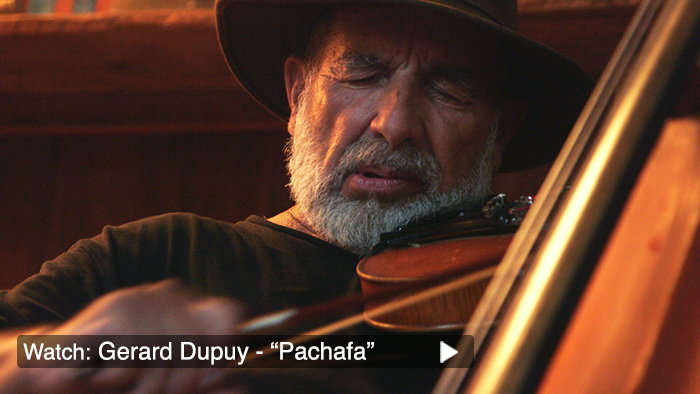
This article originally appeared in the Oxford American, May 2014.
The Spirit Music of Gerard Dupuy
Inspired by the field recordings of Alan Lomax, director/producer Alex Steyermark and producer/recordist Lavinia Jones Wright created The 78 Project, an ongoing documentary journey to record today’s musicians with yesterday’s technology. Using just one microphone, an authentic 1930′s PRESTO direct-to-disc recorder, and a blank lacquer disc, the musicians are invited to cut a record anywhere they choose. The result is an artifact—a 78rpm record—and a new connection to our cultural legacy. 78 Project participant Rosanne Cash called the experience “time-travel.” Click here for “Back to the Future,” author William Gibson’s introduction to the project.
Last summer, The 78 Project visited southern Louisiana to film and record Cajun music at the source, as Lomax had done in the 1930s.
+ + +
“Bonjour! Comment ça va?”
The Cajun Stump Jumper starts each phone call in French, and laughs in a deep, delighted rattle when he realizes that his French is not understood. Fifty percent of The 78 Project speaks French fluently, but that half is always driving.
He barrels on in English, inviting us—commanding us, really—to stay in his house. His wife will make us dinner and we’ll go for a ride in his truck, check out his old cabin from the 1920s. Every sentence comes through the phone with an infectious joie de vivre. “A little pleasure with our business!” he says twice.
Though well-spoken, Gerard Dupuy’s English—like his French—flirts with slang, and, perhaps as a result of his having taught Adult Education at Angola prison for 30 years, he can be disarmingly direct. His accent is bending, and the tone of his voice commands the mood of the conversation. Throughout most of the summer, Gerard has been painting his house. He’s not finished yet, he tells us, but it is pas de problem—we can come whenever we’d like if we just give him about a week’s notice. He’ll cancel that day’s painting. He gives us his address and two routes to his place. One, he says, is more scenic. Then he pauses for a moment, listening to someone else in the room with him. “My wife says you all gonna get lost.” He laughs. “Don’t use your GPS. It’ll get you to my place eventually, but it’ll take you through a swamp. It’s pretty! But I don’t think you’d make it.”
+ + +
We meet Gerard at a scrapyard in Moncla, and follow him down a long dirt road to his house. “We’re the north fort of Cajun culture!” Gerard tells us, as he parks his truck to lead us across his lawn and into the kitchen, where he removes the tobacco pipe from his mouth and takes a drink of water.
Moncla is a tiny corner of the town of Marksville, located in the ankle crease of Louisiana’s boot. The seat of the Avoyelles Parish, Marksville is a late-eighteenth-century hub of immigration where French, French-Canadian, Spanish, African, and Native American people mingled together. When Gerard calls it the north fort, he’s referring to the fact that these days the hub of traditional Cajun music sits to the south, in and around Lafayette—where we spent the early part of our week—in the arch of the sole.
Nothing we saw around Lafayette is a more genuine piece of folk art than Gerard’s house. As he leads us through it, he explains how he has constructed it over his lifetime, one winding and intuitive section at a time. It’s a glorious, rambling narrative, varied in material and construction. The top-floor landing is flooded in the colored light from a grand 5-foot stained-glass church window, as if the house has one steady, kaleidoscopic eye on the bayou.
Gerard, wanting to show us the rest of his property, offers to drive us along the Red River that scribbles its northern border. We climb into his truck, worn-out from years of off-roading and construction work. The heat is stuck on in the cab. There’s a trick to getting the door to shut. Bottles, knives, and tools rattle around on the dashboard, musical instruments bang around in the bed.
Words spill from Gerard in a continuous, melodic stream, as if his whole lifetime of stories sits spring-loaded at the front of his mind, ready to unwind for each new set of ears. Though he stands only around five feet, he is solidly built and incredibly strong. In driving, his movements are light, quick, and confident. When he talks, he looks back and forth between the road and our faces, the worn leather hat that has molded itself to the shape of his head accenting the gesture. His stature and style cut a profile eerily similar to what you might imagine his French ancestors looked like two hundred years ago. His precious fiddle lies across our laps and bangs our knees as we barrel over the ruts and dips in the dirt road.
+ + +
Louis Michot of the Lost Bayou Ramblers, who we recorded in Lafayette last week, recounted a story of his cousin in Marksville. He’s a fiddle player from the older generation, Louis said, and his signature is a Cyprus stump that he brings with him to gigs. He once saw Gerard fall back on the stump and continue playing wildly, rolling around, overcome, while his accordion player played on unfazed.
He’s the Cajun Stump Jumper, we said.
Cho! Co!
“I didn’t know he was known that way!” Louis seemed excited at the new connection. “Just thought he was a guy who jumped a Cyprus stump.”
+ + +
Driving through the woods past his daughter’s house, Gerard asks us about our week in Louisiana so far. He wants to know about the young musicians we’ve seen and recorded in our travels around the country: from his own cousin Louis in Arnaudville to Sea of Bees in Sacramento, Little Wings in Topanga Canyon, Ella Mae Bowen in Nashville, Adam Arcuragi back home in New York, who Gerard knows from a bill they once shared in Marksville. We tell him we’ll record the band Feufollet in a few days in Lafayette.
The New Cajun is a culture of welcome. Welcome is what we have found everywhere. Xenophobic, insular culture, c’est passé. Today everyone can be Cajun. The young people of Louisiana tell us that they are learning to speak French by choice, learning accordion and fiddle out of respect for their heritage. For Alex, speaking the French of his mother’s Quebecois family each day is a deeply personal experience. And the curiosity of the musicians, their sincere eagerness to collaborate and share, is moving to us both. We all yearn to belong to something bigger than ourselves, and though each of our stories will be different, we are bonded by our journey to find them.
When we mention Feufollet, he wants to know what we know of the feux follets, the fires in the swamps; the little lights that some Cajuns believe lead you home and some believe lead you to mischief.
“Patchafa.” He says. He sees the lights sometimes, late at night. “Patchafa,” he repeats. “The swamp devil.” Gerard stops the truck periodically, grabs his fiddle, and jumps out to play it, trying the sounds everywhere, testing the air, singing a bit. His dogs, Hooch, Kijo and Gypsy, who’ve been following us, stop and wait patiently when he does this. Once Gerard feels satisfied, we move on.
Dupuy’s property is overgrown, and the road through it is worn with ruts so deep the truck gets stuck sometimes and we have to rock it out. He tells us the story of one Christmas when he was working at Angola and his truck got stuck in a snowdrift far out on the farm. He had to radio for help and wait for the inmate on duty to come pull him out. Angola is a huge place, and he waited a long time in the dark.
We turn a bend in the road, and the 100-year-old wooden cabin appears. The forest around it crowds in close, but Gerard’s handiwork and love for the structure has kept it from being taken. He loans out the cabin for Civil War reenactments, he tells us. It doubles as a fort, and he doubles as a rebel (Dupuy’s grandfather was a Civil War soldier with a survival story that involved a hollow log and a spider web).
On the back porch we meet the famed Cyprus stump. Gerard shows us how it works, playing his fiddle while seated on the edge of it, stomping out a rhythm on a homemade pedal-and-pipe machine. He does not jump, the mood never reaches that pitch. It’s more of a mellow, early evening song.
Moving inside, he improvises a blues on guitar and harp.
Patchafa! The first will be last and the last will be first!
He plays the whole house. The ceilings answer his feet on the floor. He is telling the story of our day so far, singing to the people and ideas that have passed through our conversation.
The song is done. A light rain starts to fall. A little look at the river, then it’s time to relax. A short mission into town and the truck is loaded with boudin, dried shrimp, Coors Light. He drives us up the levy road under a big moon as armadillos scurry to avoid the truck’s tires.
“What the shit you all doing on a back road in Louisiana right now, eh?” He chuckles.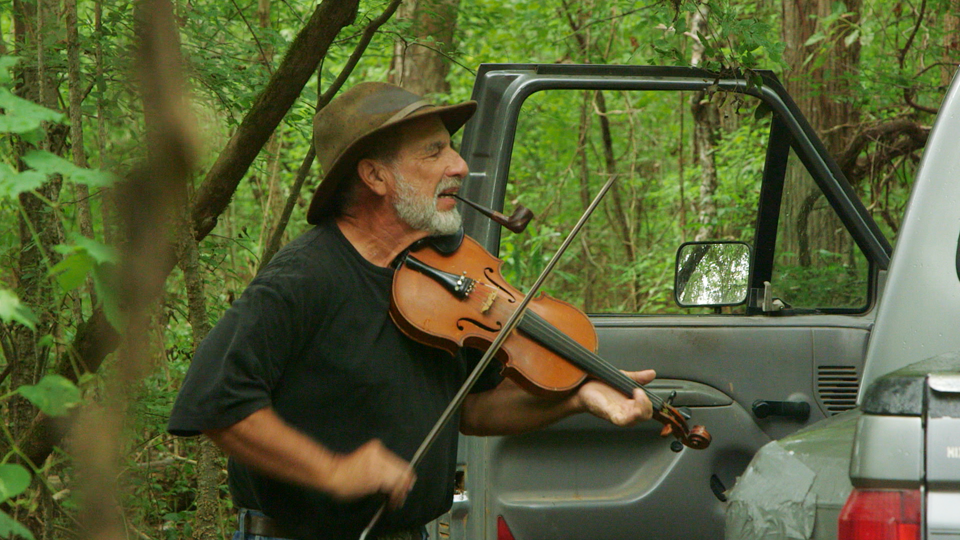
+ + +
When the sun comes up, work begins on the house (Gerard is repainting) and the sounds of ladders hitting the wall wake the household. His energy is miraculous considering that 3 a.m. this morning had found us in the Fort DeRussy Cemetery, asking the advice of his spirit acquaintances.
Keep the lights on and the motor running. Watch out for loup-garou. Werewolf. Nous sommes invités.
This morning we are tired, but the night’s long efforts had paid off. Inspiration had struck! We would be ready to record tonight. The reason for the song may have been discovered: Unpredictability is the key to survival. You have to unchord.
Today, before we make our record, Gerard wants to take us around town in the daylight, improvising our tour like he improvises his songs. We take our little gray Kia and he sits shotgun, pointing out noteworthy places and announcing unscheduled stops. The car feels powered by his enthusiasm, guided by the track of his sweeping, looping narration. “That’s the oldest establishment in town, there! You like crab burgers? Let’s get us some!”
Gerard asks us a lot of questions about New York. He wants to know about Coney Island and the Bronx, Hurricane Sandy and September 11th. He wants to know about our backyard gardens at home—what do we grow? His memory is fantastic and he can converse on almost any topic. There is a hunger to know, to relate. He hasn’t travelled much, besides a recent music-driven pilgrimage to France, but he knows about people.
Gerard tells us repeatedly, jovially, that he is not technically Cajun or Acadian. Nor is he, technically, Creole. He identifies most as French Colonial, his ancestors having come to the area in the 1700s and maintained their European cultural ties. It’s the reason that the trip to France, which he mentions often, was so meaningful for him. And he has an intense pride and interest in Civil War stories. He feels the importance of his people choosing to fight in a war to defend a land they had only newly adopted as their own. In his mind, he is a Frenchman who fought for the South.
He takes us to the nearby public wildlife refuge so we can see the gnarled Cyprus roots, the swamp weeds, the alligators. We watch a gator slowly stalk a bird, gliding toward it like a log. Gerard bends down to the water to wiggle his fingers below its surface. Can it be safe to be so close to the water with gators in it? We’ve hiked down the embankment to the water with him. “They’re timid. Timid,” he declares. “Till you draw blood.”
In the car as we head back to his house to record, he’s pensive, a little tired from the three hours of sleep. He says very little for the first time since we’ve been with him. In the heat and the tiring light of the Louisiana afternoon he suddenly seems his age.
+ + +
We return to the house and start to set up. Gerard naps, briefly, and returns to the kitchen recharged and smartly dressed in a clean black t-shirt, blue jeans, and boots. The weariness of the afternoon is gone like a mirage. His hat, his constant companion, sits with integrity at the top of the new outfit. His performance attire.
He is far away again, somewhere just distantly off this plane of existence, not quite in our reality now, ready to converse with his French Colonial ancestors and whatever other spirits might be out tonight.
We have set up in his music room, attached to the kitchen by two French doors, and he joins us there, taking a look at the Presto, and then wandering over to inspect his bass, guitar, and fiddle to see which is speaking to him. As he tries each one in turn, he explains that his intention when he plays is usually to affect the experience of the room as a whole. To create a common experience. He explains that he can’t know what we’re thinking about as we’re listening, just as we cannot be privy to what he’s thinking about when he’s playing.
“But at least I’m controlling the feelings with the vibrations.”
The first song he calls an interpretation of a traditional Cajun Mardi Gras captain’s call, the other is an improvisation. Both are completely dragged into being on the spot and neither contains a trace of traditional song structure.
Gerard plays the instruments by bowing them at various levels of tension and hitting them with short lengths of PVC piping. He slides the short pipe between the strings of the bull fiddle and bows it until it emits a high-pitched, faraway moan. Wind through a reed. His shredded bow draws rhythmically across the low, coiled strings. They tremble with the intensity of the gesture and respond, quivering at his beckoning.
“Mardi Gras!” He hollers. He waits, then hollers more. He is invoking. Defante! Defan Pauvre! He seems to say. Nous sommes en d’oeuille. We are in mourning.
His music tonight is a war chant, an exorcism, a question to the universe about what’s just beyond the furthest reaches of our sense of sight and sound. The spirituality it expresses exists beside and beyond the Catholic pageantry of his French ancestry, the scholarly Mormonism of his wife, the witchy Voodoo of the swamp woods all around.
Dit mon la verite’!
It feels like a new religion he is inventing on the spot. There seems to be no bottom to it, no satisfying finish possible once things have gotten this far away from the ground, but the songs eventually conclude. They must. The record is full and the Presto switches off.
He is back in the room.
“Great spirit,” he says. “Uncharted waters, man.”
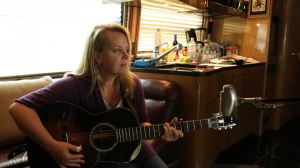 Mary Chapin Carpenter was a headliner at the Philadelphia Folk Festival, and she offered to spend the afternoon before her set making a record with us in her tour bus. The most gracious host that she is, she not only invited us with all of our gear aboard her home away from home, she also let us turn off her air conditioning so that it wouldn’t interfere with the recording and serenely braved the August heat. Mary Chapin’s nature is graceful, and her performance was powerful, a combination that mesmerized and awed us. She sang “The Water is Wide” with the sure, patient voice and agile finger-picking of a person who has always known a song.
Mary Chapin Carpenter was a headliner at the Philadelphia Folk Festival, and she offered to spend the afternoon before her set making a record with us in her tour bus. The most gracious host that she is, she not only invited us with all of our gear aboard her home away from home, she also let us turn off her air conditioning so that it wouldn’t interfere with the recording and serenely braved the August heat. Mary Chapin’s nature is graceful, and her performance was powerful, a combination that mesmerized and awed us. She sang “The Water is Wide” with the sure, patient voice and agile finger-picking of a person who has always known a song.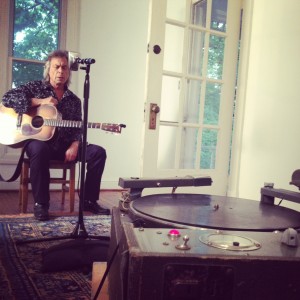 In Nashville, as in Memphis, we felt cozy and at home. Infinitely welcoming person that he is, Jim Lauderdale made us feel even more so. He gave us the run of a beautiful house from the 1890s, and a heartbreakingly gorgeous a capella performance of “Before This Time Another Year”. It’s no wonder that Jim is a constant collaborator. His musicality is superb, and he himself is the kindest of souls.
In Nashville, as in Memphis, we felt cozy and at home. Infinitely welcoming person that he is, Jim Lauderdale made us feel even more so. He gave us the run of a beautiful house from the 1890s, and a heartbreakingly gorgeous a capella performance of “Before This Time Another Year”. It’s no wonder that Jim is a constant collaborator. His musicality is superb, and he himself is the kindest of souls.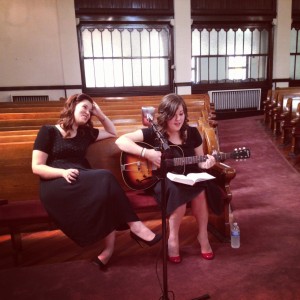 Lovely, real life sisters Laura and Lydia, their fluttery, haunting voices in tight sibling harmony, the light through the stained glass, the sounds dispersing through the air all the way up to the ceiling. When they sang “In the Sweet By and By” and an original called “Little Again,” they invoked the timeless closeness of family. And during the giddy playback, they overflowed with the fresh energy of new experiences.
Lovely, real life sisters Laura and Lydia, their fluttery, haunting voices in tight sibling harmony, the light through the stained glass, the sounds dispersing through the air all the way up to the ceiling. When they sang “In the Sweet By and By” and an original called “Little Again,” they invoked the timeless closeness of family. And during the giddy playback, they overflowed with the fresh energy of new experiences.
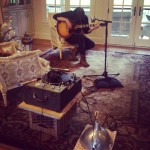 We hit Nasvhille in the afternoon on Tuesday, and went straight over to record with
We hit Nasvhille in the afternoon on Tuesday, and went straight over to record with 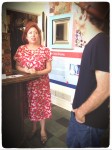 Our dear friend Willie of
Our dear friend Willie of 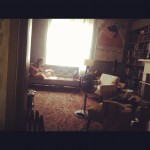
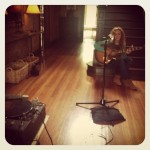 Thursday bright and early we joined
Thursday bright and early we joined 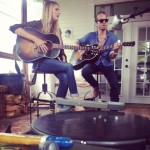 Holly Williams
Holly Williams

